Classical Theories of International Trade Lecture 2
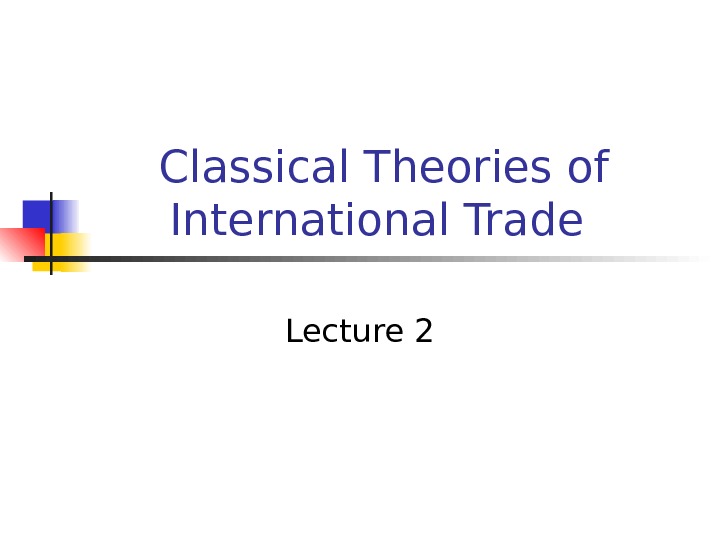


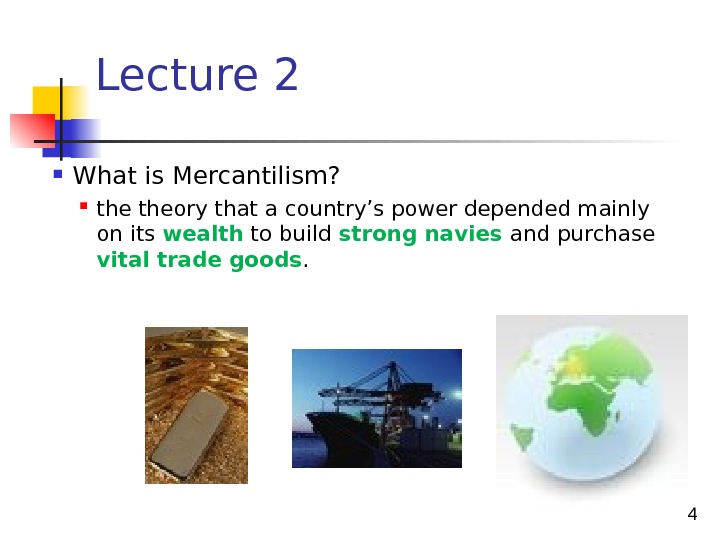

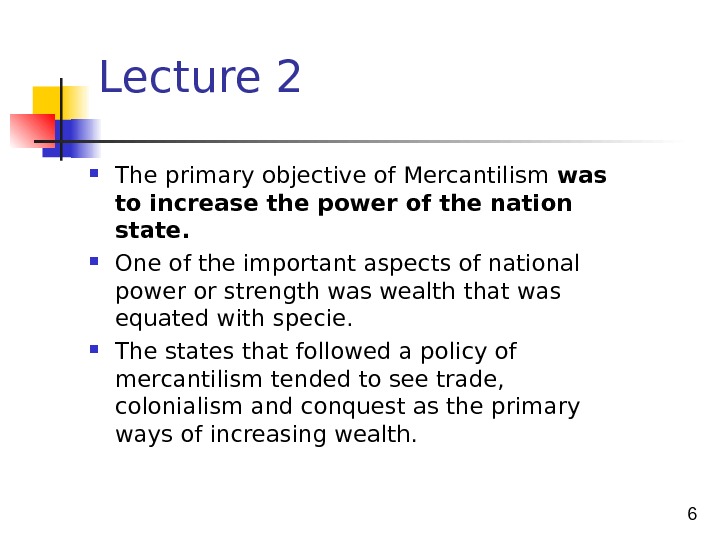
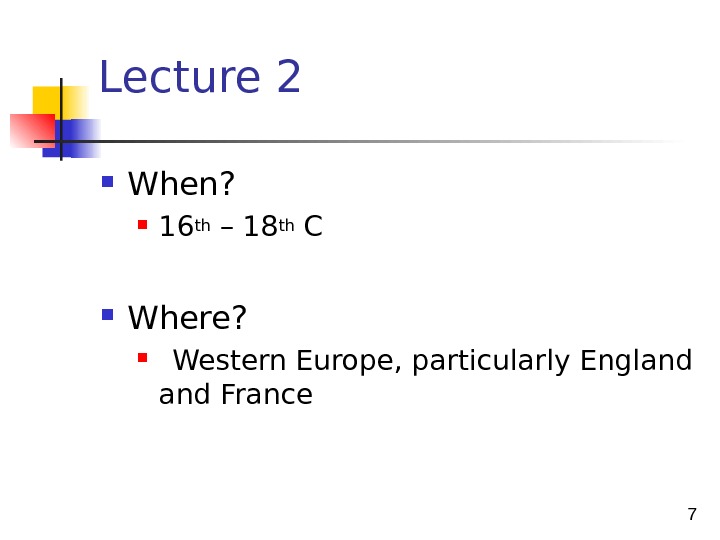
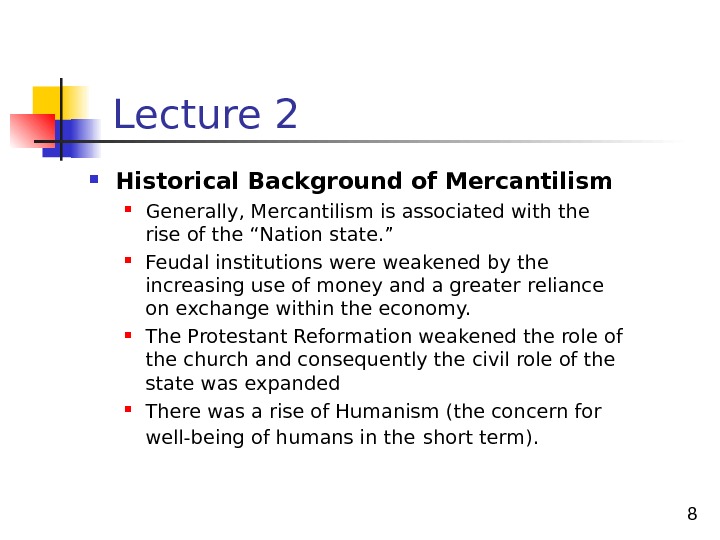
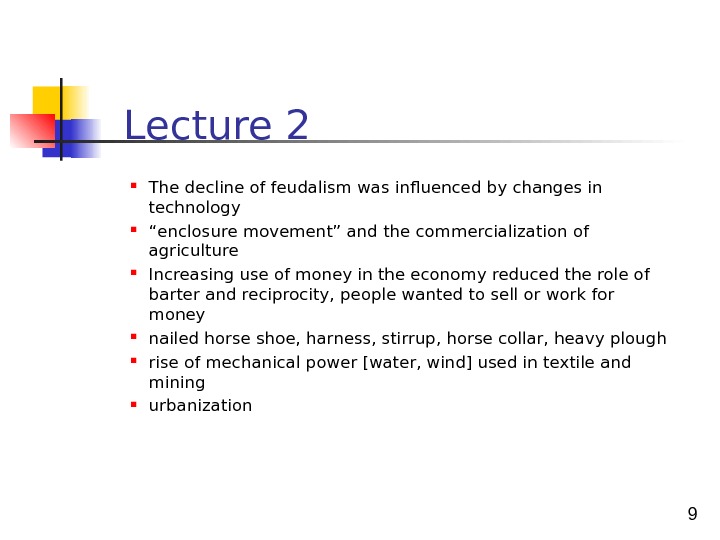
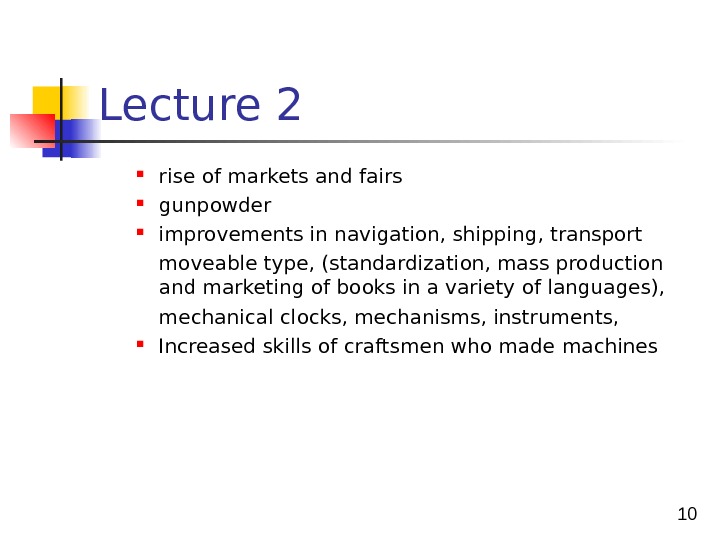
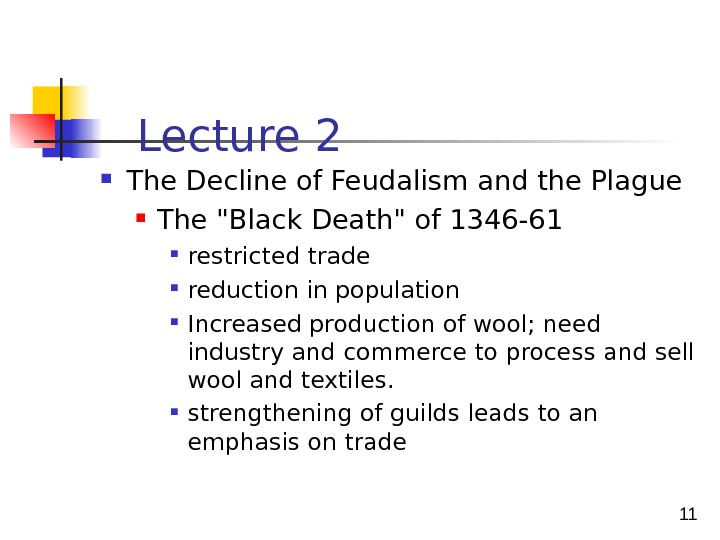
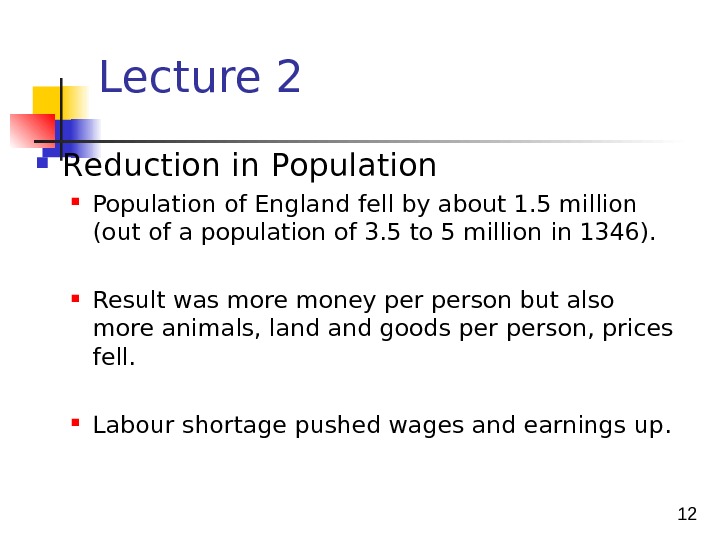
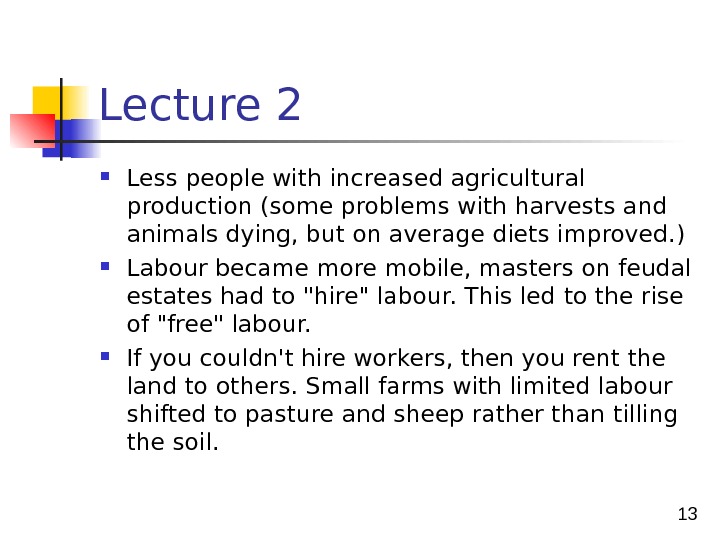




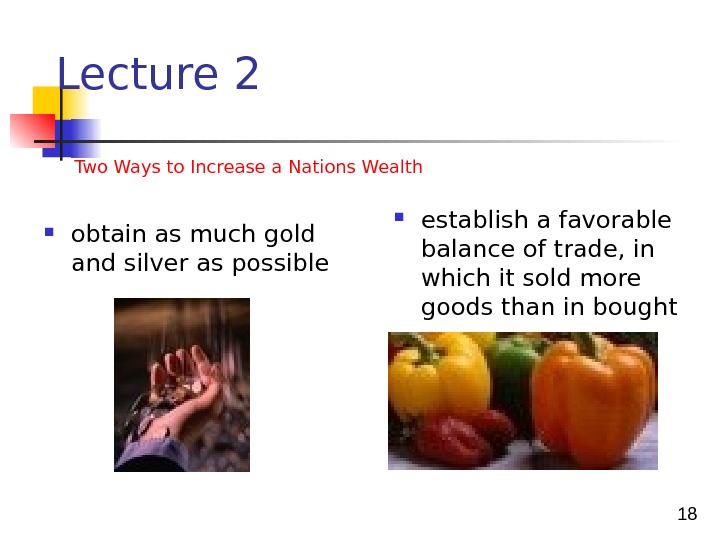





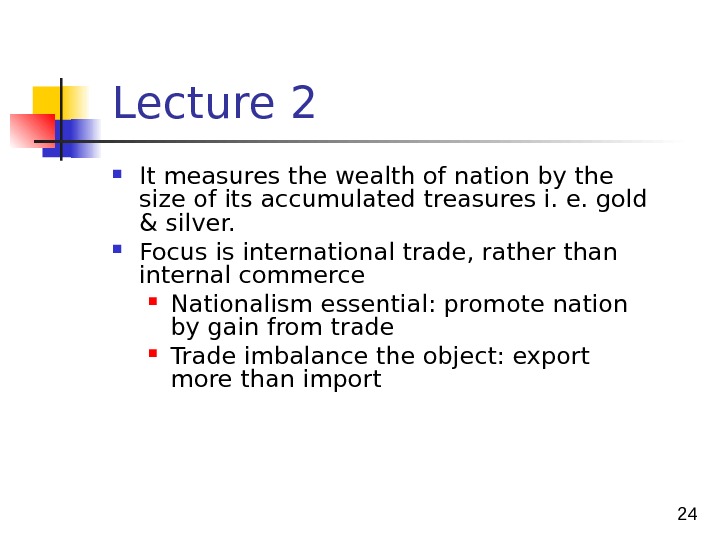
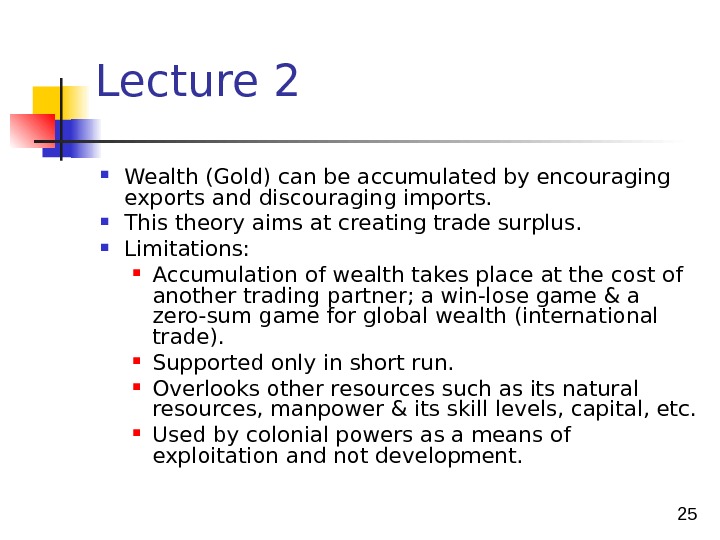
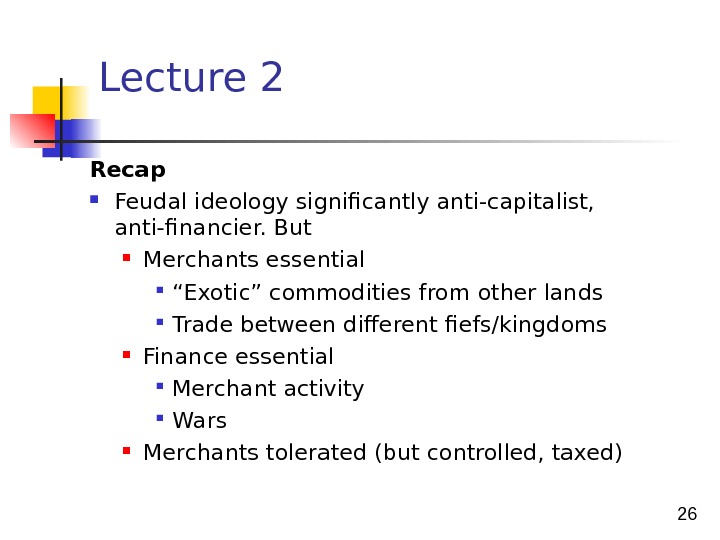
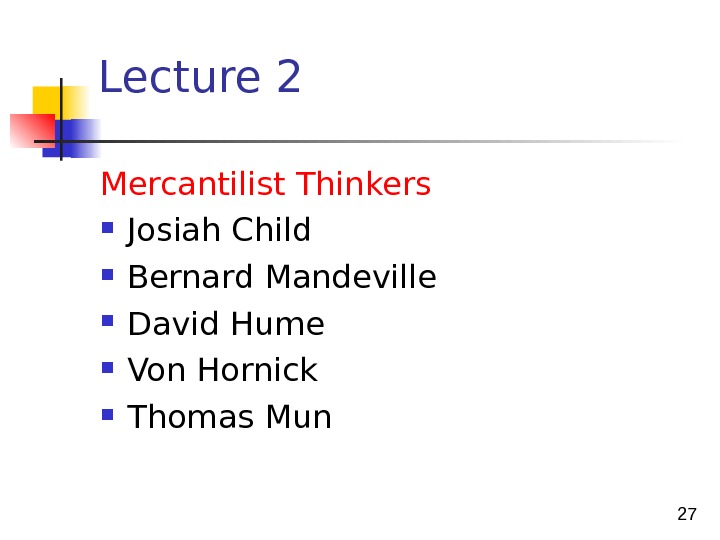
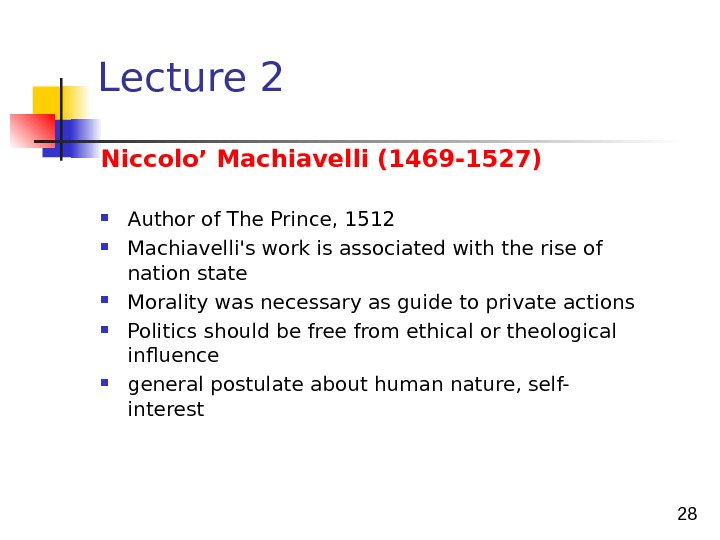
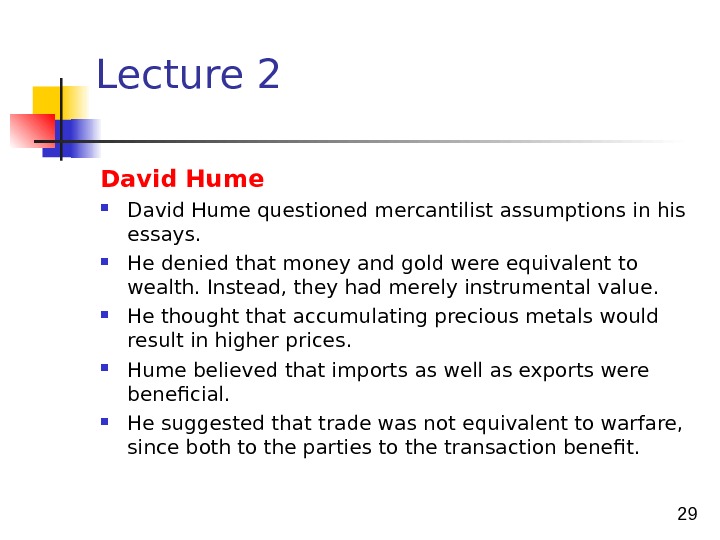

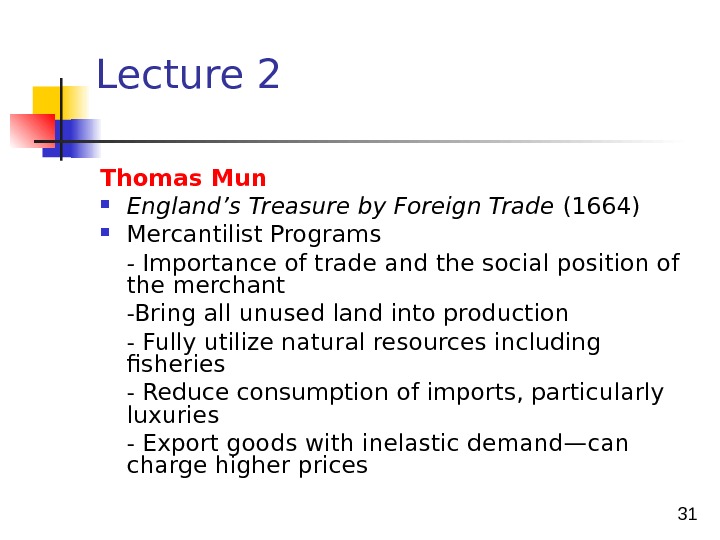
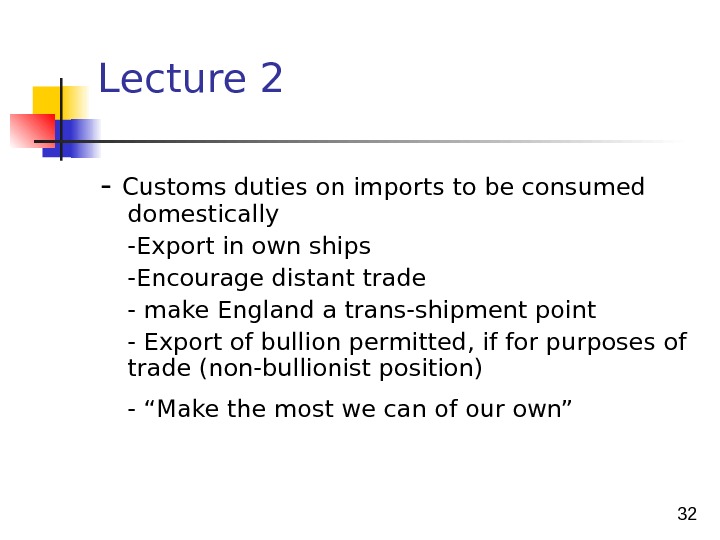
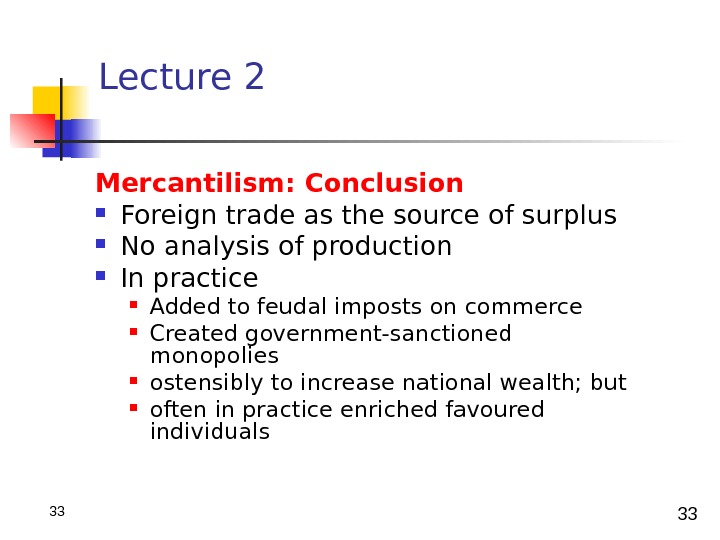
class_th_of_int_trade_-_lecture_2.ppt
- Размер: 731 Кб
- Количество слайдов: 33
Описание презентации Classical Theories of International Trade Lecture 2 по слайдам
 Classical Theories of International Trade Lecture
Classical Theories of International Trade Lecture
 2 Lecture 2 Evolution of Trade Theories Mercantilism Absolute Advantage Comparative Advantage Factor proportion Trade International Product Cycle New Trade Theory National Competitive Advantage
2 Lecture 2 Evolution of Trade Theories Mercantilism Absolute Advantage Comparative Advantage Factor proportion Trade International Product Cycle New Trade Theory National Competitive Advantage
 3 Lecture 2 Outline o Introduction to Mercantilism o Historical B ackground of Mercantilism o Main Points o Mercantilist T hinkers o Conclusion
3 Lecture 2 Outline o Introduction to Mercantilism o Historical B ackground of Mercantilism o Main Points o Mercantilist T hinkers o Conclusion
 4 Lecture 2 What is Mercantilism? theory that a country’s power depended mainly on its wealth to build strong navies and purchase vital trade goods.
4 Lecture 2 What is Mercantilism? theory that a country’s power depended mainly on its wealth to build strong navies and purchase vital trade goods.
 5 Lecture 2 Mercantilism had no systematic, comprehensive, consistent treatise, no leader, common method, or theory. Each “mercantilist» sought advantage for a specific, trade, merchant, joint-stock company or social group. «Protectionism» is often seen as a primary characteristic of Mercantilism.
5 Lecture 2 Mercantilism had no systematic, comprehensive, consistent treatise, no leader, common method, or theory. Each “mercantilist» sought advantage for a specific, trade, merchant, joint-stock company or social group. «Protectionism» is often seen as a primary characteristic of Mercantilism.
 6 Lecture 2 The primary objective of Mercantilism was to increase the power of the nation state. One of the important aspects of national power or strength was wealth that was equated with specie. The states that followed a policy of mercantilism tended to see trade, colonialism and conquest as the primary ways of increasing wealth.
6 Lecture 2 The primary objective of Mercantilism was to increase the power of the nation state. One of the important aspects of national power or strength was wealth that was equated with specie. The states that followed a policy of mercantilism tended to see trade, colonialism and conquest as the primary ways of increasing wealth.
 7 Lecture 2 When? 16 th – 18 th C Where? Western Europe, particularly England France
7 Lecture 2 When? 16 th – 18 th C Where? Western Europe, particularly England France
 8 Historical Background of Mercantilism Generally, Mercantilism is associated with the rise of the “Nation state. ” Feudal institutions were weakened by the increasing use of money and a greater reliance on exchange within the economy. The Protestant Reformation weakened the role of the church and consequently the civil role of the state was expanded There was a rise of Humanism (the concern for well-being of humans in the short term). Lecture
8 Historical Background of Mercantilism Generally, Mercantilism is associated with the rise of the “Nation state. ” Feudal institutions were weakened by the increasing use of money and a greater reliance on exchange within the economy. The Protestant Reformation weakened the role of the church and consequently the civil role of the state was expanded There was a rise of Humanism (the concern for well-being of humans in the short term). Lecture
 9 The decline of feudalism was influenced by changes in technology “ enclosure movement” and the commercialization of agriculture Increasing use of money in the economy reduced the role of barter and reciprocity, people wanted to sell or work for money nailed horse shoe, harness, stirrup, horse collar, heavy plough rise of mechanical power [water, wind] used in textile and mining urbanization. Lecture
9 The decline of feudalism was influenced by changes in technology “ enclosure movement” and the commercialization of agriculture Increasing use of money in the economy reduced the role of barter and reciprocity, people wanted to sell or work for money nailed horse shoe, harness, stirrup, horse collar, heavy plough rise of mechanical power [water, wind] used in textile and mining urbanization. Lecture
 10 Lecture 2 rise of markets and fairs g unpowder improvements in navigation, shipping, transport moveable type, (standardization, mass production and marketing of books in a variety of languages), mechanical clocks, mechanisms, instruments, Increased skills of craftsmen who made machines
10 Lecture 2 rise of markets and fairs g unpowder improvements in navigation, shipping, transport moveable type, (standardization, mass production and marketing of books in a variety of languages), mechanical clocks, mechanisms, instruments, Increased skills of craftsmen who made machines
 11 Lecture 2 The Decline of Feudalism and the Plague The «Black Death» of 1346 -61 restricted trade reduction in population Increased production of wool; need industry and commerce to process and sell wool and textiles. strengthening of guilds leads to an emphasis on trade
11 Lecture 2 The Decline of Feudalism and the Plague The «Black Death» of 1346 -61 restricted trade reduction in population Increased production of wool; need industry and commerce to process and sell wool and textiles. strengthening of guilds leads to an emphasis on trade
 12 Lecture 2 R eduction in P opulation Population of England fell by about 1. 5 million (out of a population of 3. 5 to 5 million in 1346). Result was more money person but also more animals, land goods person, prices fell. Labour shortage pushed wages and earnings up.
12 Lecture 2 R eduction in P opulation Population of England fell by about 1. 5 million (out of a population of 3. 5 to 5 million in 1346). Result was more money person but also more animals, land goods person, prices fell. Labour shortage pushed wages and earnings up.
 13 Lecture 2 Less people with increased agricultural p roduction (some problems with harvests and animals dying, but on average diets improved. ) Labour became more mobile, masters on feudal estates had to «hire» labour. This led to the rise of «free» labour. If you couldn’t hire workers, then you rent the land to others. Small farms with limited labour shifted to pasture and sheep rather than tilling the soil.
13 Lecture 2 Less people with increased agricultural p roduction (some problems with harvests and animals dying, but on average diets improved. ) Labour became more mobile, masters on feudal estates had to «hire» labour. This led to the rise of «free» labour. If you couldn’t hire workers, then you rent the land to others. Small farms with limited labour shifted to pasture and sheep rather than tilling the soil.
 1414 Lecture 2 Medieval Breakdown Feudal system imposed many imposts upon merchants/tradesmen/moneylenders; but social change went against feudalism: Growth of specialist manufactures in towns: the guilds Growth of specialist traders between nations: the Mercantilists Revolt against religious strictures against merchants/lending, church hypocrisy Religious revolts: beginnings of Protestantism bound up with growth of merchants/financiers A new ideology/analysis struggled for dominance: Mercantilism
1414 Lecture 2 Medieval Breakdown Feudal system imposed many imposts upon merchants/tradesmen/moneylenders; but social change went against feudalism: Growth of specialist manufactures in towns: the guilds Growth of specialist traders between nations: the Mercantilists Revolt against religious strictures against merchants/lending, church hypocrisy Religious revolts: beginnings of Protestantism bound up with growth of merchants/financiers A new ideology/analysis struggled for dominance: Mercantilism
 15 Lecture 2 1500 s and 1600 s Invention of printing with movable type gave rise to economic literature written by lay people Thomas Wilson (1525 -81) wrote Discourse on Usury (1572) Charles Dumoulin (Latinized as Molinaeus) wrote Treatise on Contracts and Usury (1546) Denied that interest was forbidden by divine law Suggested public regulation of lending and interest Inflow of gold and silver from the New World
15 Lecture 2 1500 s and 1600 s Invention of printing with movable type gave rise to economic literature written by lay people Thomas Wilson (1525 -81) wrote Discourse on Usury (1572) Charles Dumoulin (Latinized as Molinaeus) wrote Treatise on Contracts and Usury (1546) Denied that interest was forbidden by divine law Suggested public regulation of lending and interest Inflow of gold and silver from the New World
 16 Lecture 2 Main Points of Mercantilism: Economics as applied statecraft Promotion of National wealth and power Importance of trade surpluses Trade surplus leads to a net gold inflow, and thereby to greater national wealth and power Encourage domestic production and exports, discourage imports
16 Lecture 2 Main Points of Mercantilism: Economics as applied statecraft Promotion of National wealth and power Importance of trade surpluses Trade surplus leads to a net gold inflow, and thereby to greater national wealth and power Encourage domestic production and exports, discourage imports
 17 Lecture 2 Economics as statecraft not analysis Tendency to see gold and “treasure” as constituting national wealth Emphasis on balance of trade surpluses Emphasis on maximizing productivity and output Role of government in encouraging domestic manufacturing and exports while minimizing imports Link between money supply and prices
17 Lecture 2 Economics as statecraft not analysis Tendency to see gold and “treasure” as constituting national wealth Emphasis on balance of trade surpluses Emphasis on maximizing productivity and output Role of government in encouraging domestic manufacturing and exports while minimizing imports Link between money supply and prices
 18 Lecture 2 Two Ways to Increase a Nations Wealth obtain as much gold and silver as possible establish a favorable balance of trade, in which it sold more goods than in bought
18 Lecture 2 Two Ways to Increase a Nations Wealth obtain as much gold and silver as possible establish a favorable balance of trade, in which it sold more goods than in bought
 19 Lecture 2 Mercantilism = unfair or unbalanced trade Mercantilism Explained colonies existed for the benefit of the Mother Country Source of Raw materials = cheap shipped to M. C. to be turned into finished goods Finished good shipped to Colony = expensive profit goes to M. C. Pass laws forbidding colonies from producing their own goods
19 Lecture 2 Mercantilism = unfair or unbalanced trade Mercantilism Explained colonies existed for the benefit of the Mother Country Source of Raw materials = cheap shipped to M. C. to be turned into finished goods Finished good shipped to Colony = expensive profit goes to M. C. Pass laws forbidding colonies from producing their own goods
 20 Lecture 2 Triangular Trade Europeans transported manufactured goods to the west coast of Africa
20 Lecture 2 Triangular Trade Europeans transported manufactured goods to the west coast of Africa
 21 Lecture 2 Traders then exchanged these goods for captured Africans who were then sold in the Americas
21 Lecture 2 Traders then exchanged these goods for captured Africans who were then sold in the Americas
 22 Lecture 2 Merchants then bought sugar, coffe e , and t o ba c co in the West Indies and sailed back to E urope to sell these product s.
22 Lecture 2 Merchants then bought sugar, coffe e , and t o ba c co in the West Indies and sailed back to E urope to sell these product s.
 23 Lecture 2 Long Term Results global trade routes shifted over time the old silk routes declined West Asia and the Islamic world were displaced as the centralized location of global trade the Atlantic and Pacific sea routes become the new focus of global trade
23 Lecture 2 Long Term Results global trade routes shifted over time the old silk routes declined West Asia and the Islamic world were displaced as the centralized location of global trade the Atlantic and Pacific sea routes become the new focus of global trade
 24 Lecture 2 It measures the wealth of nation by the size of its accumulated treasures i. e. gold & silver. Focus is international trade, rather than internal commerce Nationalism essential: promote nation by gain from trade Trade imbalance the object: export more than import
24 Lecture 2 It measures the wealth of nation by the size of its accumulated treasures i. e. gold & silver. Focus is international trade, rather than internal commerce Nationalism essential: promote nation by gain from trade Trade imbalance the object: export more than import
 25 Lecture 2 Wealth (Gold) can be accumulated by encouraging exports and discouraging imports. This theory aims at crea ti ng trade surplus. Limitations: Accumulation of wealth takes place at the cost of another trading partner; a win-lose game & a zero-sum game for global wealth (international trade). Supported only in short run. Overlooks other resources such as its natural resources, manpower & its skill levels, capital, etc. Used by colonial powers as a means of exploitation and not development.
25 Lecture 2 Wealth (Gold) can be accumulated by encouraging exports and discouraging imports. This theory aims at crea ti ng trade surplus. Limitations: Accumulation of wealth takes place at the cost of another trading partner; a win-lose game & a zero-sum game for global wealth (international trade). Supported only in short run. Overlooks other resources such as its natural resources, manpower & its skill levels, capital, etc. Used by colonial powers as a means of exploitation and not development.
 26 Lecture 2 Recap Feudal ideology significantly anti-capitalist, anti-financier. But Merchants essential “ Exotic” commodities from other lands Trade between different fiefs/kingdoms Finance essential Merchant activity Wars Merchants tolerated (but controlled, taxed)
26 Lecture 2 Recap Feudal ideology significantly anti-capitalist, anti-financier. But Merchants essential “ Exotic” commodities from other lands Trade between different fiefs/kingdoms Finance essential Merchant activity Wars Merchants tolerated (but controlled, taxed)
 27 Lecture 2 Mercantilist T hinkers Josiah Child Bernard Mandeville David Hume Von Hornick Thomas Mun
27 Lecture 2 Mercantilist T hinkers Josiah Child Bernard Mandeville David Hume Von Hornick Thomas Mun
 28 Lecture 2 Niccolo’ Machiavelli (1469 -1527) Author of The Prince, 1512 Machiavelli’s work is associated with the rise of nation state Morality was necessary as guide to private actions Politics should be free from ethical or theological influence general postulate about human nature, self- interest
28 Lecture 2 Niccolo’ Machiavelli (1469 -1527) Author of The Prince, 1512 Machiavelli’s work is associated with the rise of nation state Morality was necessary as guide to private actions Politics should be free from ethical or theological influence general postulate about human nature, self- interest
 29 Lecture 2 David Hume questioned mercantilist assumptions in his essays. He denied that money and gold were equivalent to wealth. Instead, they had merely instrumental value. He thought that accumulating precious metals would result in higher prices. Hume believed that imports as well as exports were beneficial. He suggested that trade was not equivalent to warfare, since both to the parties to the transaction benefi t.
29 Lecture 2 David Hume questioned mercantilist assumptions in his essays. He denied that money and gold were equivalent to wealth. Instead, they had merely instrumental value. He thought that accumulating precious metals would result in higher prices. Hume believed that imports as well as exports were beneficial. He suggested that trade was not equivalent to warfare, since both to the parties to the transaction benefi t.
 30 Lecture 2 He thought that accumulating precious metals would result in higher prices. Hume believed that imports as well as exports were beneficial. He suggested that trade was not equivalent to warfare, since both to the parties to the transaction benefi t.
30 Lecture 2 He thought that accumulating precious metals would result in higher prices. Hume believed that imports as well as exports were beneficial. He suggested that trade was not equivalent to warfare, since both to the parties to the transaction benefi t.
 31 Lecture 2 Thomas Mun England’s Treasure by Foreign Trade (1664) Mercantilist Programs — Importance of trade and the social position of the merchant -Bring all unused land into production — Fully utilize natural resources including fisheries — Reduce consumption of imports, particularly luxuries — Export goods with inelastic demand—can charge higher prices
31 Lecture 2 Thomas Mun England’s Treasure by Foreign Trade (1664) Mercantilist Programs — Importance of trade and the social position of the merchant -Bring all unused land into production — Fully utilize natural resources including fisheries — Reduce consumption of imports, particularly luxuries — Export goods with inelastic demand—can charge higher prices
 32 Lecture 2 — Customs duties on imports to be consumed domestically -Export in own ships -Encourage distant trade — make England a trans-shipment point — Export of bullion permitted, if for purposes of trade (non-bullionist position) — “Make the most we can of our own”
32 Lecture 2 — Customs duties on imports to be consumed domestically -Export in own ships -Encourage distant trade — make England a trans-shipment point — Export of bullion permitted, if for purposes of trade (non-bullionist position) — “Make the most we can of our own”
 3333 Lecture 2 Mercantilism : Conclusion Foreign trade as the source of surplus No analysis of production In practice Added to feudal imposts on commerce Created government-sanctioned monopolies ostensibly to increase national wealth; but often in practice enriched favoured individuals
3333 Lecture 2 Mercantilism : Conclusion Foreign trade as the source of surplus No analysis of production In practice Added to feudal imposts on commerce Created government-sanctioned monopolies ostensibly to increase national wealth; but often in practice enriched favoured individuals
